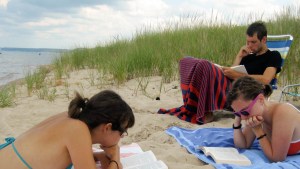The American Enterprise Institute for Public Policy Research surveyed Americans of all ages and found some very sobering things, but one of the worst was one that I haven’t seen covered much.
It said that only half of women who are college educated read books for pleasure, and only 2 out of 5 men who are college educated do the same.
That’s very sad news, because we know what the consequences will be: The same thing that happens to sports teams when nobody goes to work out.
I was commencement speaker at Frassati Academy in Plattsburg, Missouri, on May 20, and that’s what I told them.
“You often hear the argument that reading a book will do nothing for your life,” I said. “Don’t believe it.”
People will say, “When will I ever need to know why Achilles was angry at Agamemnon in the Iliad or what drove Captain Ahab mad in Moby Dick?”
They say the same thing about higher-level math. “What difference does this make? I will never use any of that stuff at work.”
Now, imagine someone said, “I will never have to bench press anything on the basketball court, so why should I bench press now?” Or, “I never have to stretch on the soccer field, so I’m not going to stretch before I play!”
You would realize that they had no idea what they were talking about. You do all of those things not because you need to do the same things in the game, but because you need to prepare your body to play the game well.
It’s the same thing with reading the Iliad and working at Chevron corporate headquarters or on Capitol Hill.
I worked at Chevron corporate headquarters with their speechwriting team, and wrote speeches for the CEO and CFO about topics I had never encountered before. I did this right after college, when I was 20, and I could only do it because I had put my mind through a workout. I attended a Great Books program in college, where I had built up my mind with the Iliad, stretched it with Aristotelian logic, and kept it stretched and warmed up by continuing to read after graduation.
I did the same thing on Capitol Hill. I worked for the Chairman of the Ways and Means Committee, and I had to write knowingly about things I had never studied: International trade agreements, tax law, and health care coverage. My brain knew how to do it, because I had spent years tackling even bigger, harder topics: Plato, Shakespeare and Dostoevsky.

“But the loss of reading doesn’t just affect individuals,” I said. “It changes nations.”
In the 1940s, George Orwell wrote, in Politics and the English Language, “[Our language] becomes ugly and inaccurate because our thoughts are foolish, but the slovenliness of our language makes it easier for us to have foolish thoughts. … if thought corrupts language, language can also corrupt thought.”
He says that by not reading, we don’t just choose a different pastime. It means we have left our minds vulnerable to bad people who can now easily trick us into doing bad things.
If he’s right, then the future of America is going to be rough. People who have never spent time challenging or stretching their minds will not be able to think through what’s right and wrong for themselves, their families, or our nation. They will easily be led to believe whatever they are told by those who want to control them. They will be putty in the hands of evil.
If you have learned to read deeply, you have been given a great gift.
You have learned that the truth is knowable, and lovable. You have learned that the truth simultaneously makes you humble and confident; it simultaneously puts you in your place and sends you out as its ambassador. If you have been given this gift, you have been called to stand in the breach and defend the true dignity of the human person as only you know it.
“So, we’re counting on you,” I ended. “We’re counting on you to read, think, and wonder about things beyond what’s right in front of you. I guarantee that, if you do, you will do more with your life than you ever thought possible.”


